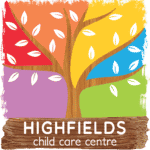As the coronavirus (COVID-19) pandemic continues to upend families’ lives, our team at Highfields Child Care Centre is committed to supporting your family and the wider community to be safe, healthy and connected.
If you’re feeling overwhelmed right now, know that you’re not alone, and that even in the midst of unforeseeable crises, it is possible to create calm, maintain a sense of normality and encourage your child’s early learning.
Here’s how:
Demonstrate self-compassion
During times of unexpected change and heightened stress, it’s crucial parents engage in self-care, says Brisbane-based clinical psychologist, Kobie Allison. “You’ll be better able to create a peaceful family environment, and — rather than a frantic parent — your child will see a parent who is taking care of themselves,” she explains.
Kobie suggests a three-step process of self-compassion:
- Mindfulness: Be mindful of the feelings that are coming up for you, and allow those feelings to be there, without judgement.
- Common humanity: Remind yourself that it’s understandable to be feeling anxious, sad or frustrated that things can’t go back to how they were. Appreciate that it’s human to feel like that — and grant others the grace that they might be feeling those things, too.
- Kindness: Engage in simple, nourishing behaviours, especially when you feel triggered. These could include reaching out to someone you feel is emotionally safe, eating wholesome foods, and exercise and meditation.
Listen HERE to Kobie’s three-minute self-compassion meditation.
Empower your child with age-appropriate information
Explaining the situation in a child-friendly way helps littlies understand what’s happening around them and may alleviate any anxiety they’re experiencing. Find a safe space for your discussion and begin by inviting your child to share what they already know. Allow them to speak freely, acknowledge their feelings and be sensitive to their reactions. If you can’t answer their questions, try searching for the answers together.
Kobie also suggests limiting your child’s exposure to media. “The news can be terrifying for an adult, let alone a child,” she says. “Be mindful about what children are seeing on TV or hearing in the background.”
Focus on ways your child can be independent and pro-active
Give your child agency by pointing out the things they can control. During the COVID-19 pandemic, that includes practising good hygiene and proper handwashing, adhering to social distancing rules, and even helping to keep the family home clean.
“We’ve been focusing a lot on handwashing,” says Claudia Smith, an early childhood teacher at our sister centre Sanctuary Mermaid Waters. “We teach the kids to sing along to Twinkle Twinkle Little Star while they wash their hands, and we’ve made a display in front of the sink for them to look at so they can follow the step-by-step instructions.”
Maintain routine
Keeping some of your regular routine in place will help your child feel secure and provide a sense of normality. “It doesn’t have to be rigid,” Claudia assures, “it’s just so they know what to expect and things feel familiar. If your child is used to getting up and getting ready for kindy every day, they can still get up and get ready to play. And you can still have morning tea, lunch and afternoon tea at similar times (meals are a good time indicator for young children who don’t yet know how to the time!).”
When it comes to supporting your little one’s early learning education at home, Claudia recommends keeping the emphasis on your child feeling relaxed and happy. “Don’t put too much pressure on yourself to make the day too timetabled. The thing your child wants most is you. Give them your time. Play with them.”
Some of Claudia’s go-to learning resources include:
- Stories, stories and more stories. “I like to read a story first, and then have children retell it in their own words. I ask what they notice in the illustrations and encourage them to predict what’s going to happen on the next page. Try to read the same book every day — the repetition helps children recognise the words and gives them the feeling they know what’s coming next.”
- The Calm app. “We use this app in class. It’s great for short five- to 10-minute meditations, and it’s also got children’s stories and nice visuals.”
- Music, songs and movement. “Children aren’t as inhibited as adults. They love music and singing. You could so something silly like a ‘Shake Awake’ (in class we always do it first thing in the morning), where you put on a song and lead your child through different movements to the beat of the music. KidsTV123 is a brilliant YouTube channel with a multitude of songs with funny, colourfully animated videos.”
- Cosmic Kids Yoga. “It’s really nicely made. The teacher takes children through a story as they do the yoga poses.”
- Carlene’s Cubbyhouse. “Carlene is an early years educator. Her Facebook page is full of ideas for playing at home in nature and using materials you already have.”
Stay connected
“We’re wired for social connection — it’s vital,” says Kobie. “Even now, with social distancing rules and quarantine measures, we’re fortunate to be able to email, FaceTime, text or call our family and friends. You could turn it into a daily ritual, so your child can look forward to connecting regularly with loved ones.”
Our educators take extra care to communicate frequently with families. “I sent a message out to my class yesterday and I got so many replies,” Claudia says. “It made me realise how much they’re missing us and how much we’re missing them. It’s so valuable to reach out as a group and keep everybody linked, even if we can’t all see each other right now. The hashtag that is trending online is so true: #weareinthistogether. We really are.”












